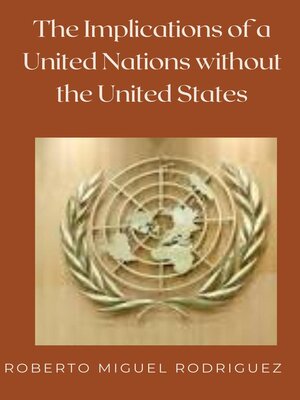
Sign up to save your library
With an OverDrive account, you can save your favorite libraries for at-a-glance information about availability. Find out more about OverDrive accounts.
Find this title in Libby, the library reading app by OverDrive.



Search for a digital library with this title
Title found at these libraries:
| Library Name | Distance |
|---|---|
| Loading... |
The United Nations (UN) has long been regarded as the cornerstone of international diplomacy, peacekeeping, and global cooperation. Established in the aftermath of World War II, the UN was designed to promote peace, security, human rights, and sustainable development across the world. Its success has been closely linked to the active participation and leadership of its member states, particularly the United States. As one of the founding members, a permanent member of the Security Council, and a major contributor to its financial and diplomatic efforts, the U.S. has played a pivotal role in shaping the direction of the UN over the past several decades.
The Implications of a United Nations without the United States explores a provocative and highly relevant question: What would the global landscape look like if the U.S. were to withdraw from or disengage with the United Nations? This book examines the potential consequences of such a scenario, not only for the functioning of the UN itself but also for the broader international order. It considers the economic, political, and security implications of a UN without the influence of the United States and explores how other global powers—such as China, Russia, and the European Union—might step into roles once dominated by American leadership.
Through in-depth analysis, this book delves into how the absence of U.S. involvement could reshape UN peacekeeping missions, humanitarian efforts, climate change negotiations, and conflict resolution initiatives. It also considers the potential for a power vacuum, where the UN's ability to address global crises and promote international cooperation might be severely weakened or transformed. The book offers insights into the possible alternatives for maintaining global stability in a scenario where the U.S. is no longer at the center of the UN's activities.
As the world becomes increasingly multipolar, the question of how to navigate international diplomacy without the United States as a dominant force in the UN is more pressing than ever. The Implications of a United Nations without the United States seeks to provide a thought-provoking exploration of this critical issue, encouraging readers to reflect on the future of global governance in an uncertain and rapidly changing world.







